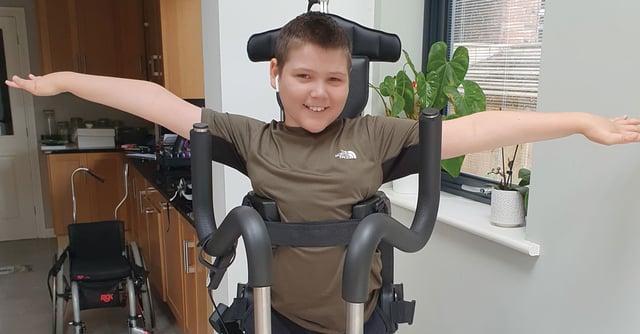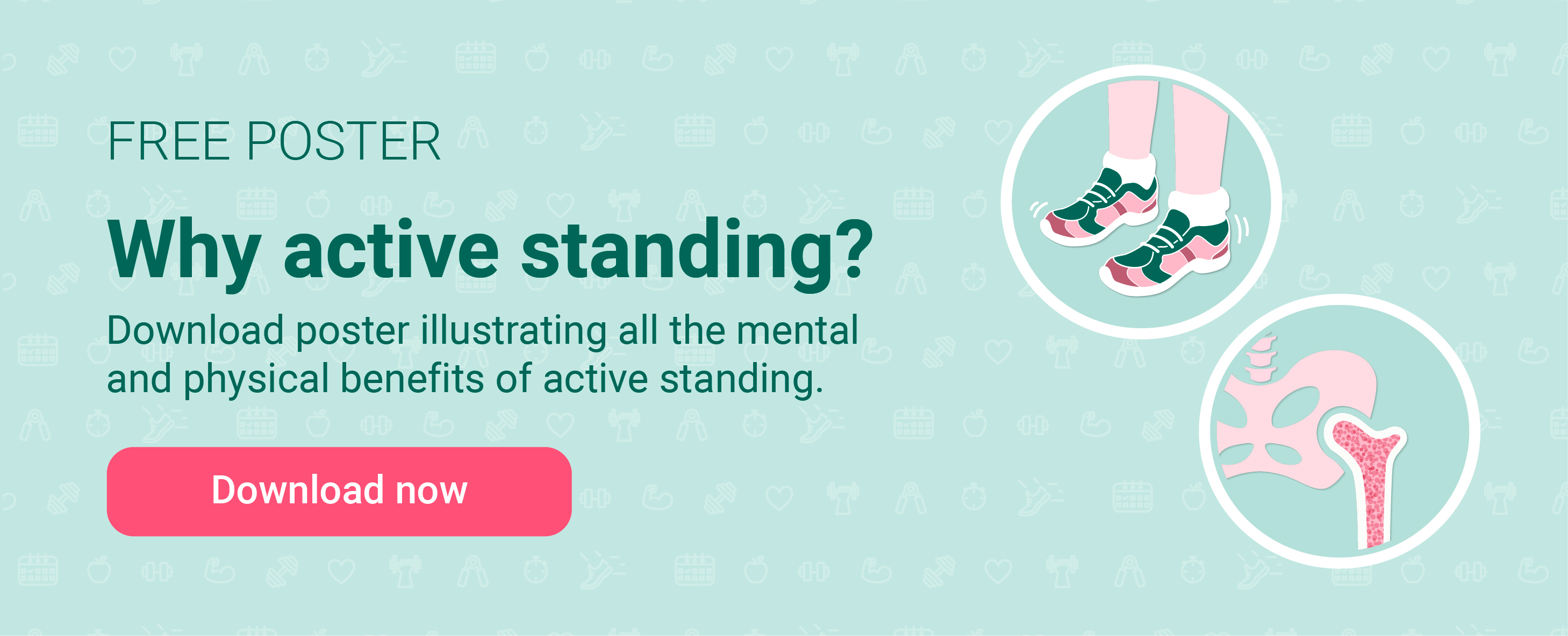
06-Oct-2022Meet Oli - an outgoing and sociable 11-year-old boy with SMA

Back to Blog Overview
Oli is a chatty, outgoing, and sociable 11-year-old boy, who loves football and gaming, especially Fortnite. Oli is like any other 11-year-old, the only difference is that he sits in a wheelchair because of his SMA.
We are in the middle of the Covid-19 pandemic and like the rest of the world we have had to adapt to this situation and communicate virtually. We met Oli’s parents Nicola and Rob on Zoom to have them tell us about their courageous son. They sit close together in front of the camera smiling at us and even though we are physically distant, they invite us into their warm welcoming home and tell us about their everyday life. Oli is at school and they hope that schools will be able to remain open during the second wave of the pandemic, because it is such an important social arena for Oli. He is especially happy when taking part in activities at school with his friends. This morning he was out of the house early to attend a hockey club.
“Oli has an extremely positive attitude and never complains” Rob tells us, “sometimes he even forgets he has a disability” Nicola continues. His disability is not on the top of his mind. He has an extremely good ability to see solutions rather than obstacles.
When Oli was diagnosed with SMA
Oli was born in 2009 and he met all his early milestones. He was sitting independently, crawling and at the age of 10-11 months, after he first started to pull himself to standing, progression seemed to slow down. He was around 15 months old when he walked with a stroller, but he did not reach the stage of independent walking. In this same period, Oli was struggling with an ear infection and while seeing the doctor, his parents mentioned that he wasn’t walking and that they had observed that his motor development seemed to have reach a plateau. In the beginning, the doctors and therapists who saw Oli believed he was simply delayed in his motor development. Physical tests and blood samples did not suggest any sign of abnormality, and his parents were told that with time Oli should develop as expected. Unfortunately, that was not the case, and after further investigations, just before Oli turned 2 years old, he was diagnosed with SMA type 2.
Realising that their son was diagnosed with a serious muscle disease, was devastating. They searched for information on the internet and at this time they didn’t know he was type 2. It was tough to read the information available and they knew little about variations even with the same SMA type.
At the point of diagnosis there were no medications for children with SMA, but luckily this has changed dramatically in the last couple of years. The family was continually searching for opportunities to attend any types of trials coming up, and it became a regular question to ask the muscle team at the hospital “Are there any new trials coming up or any new treatments?” in the hope of someone finding that missing link in the genes!
They now realize that finding that missing link is tricky. “Someone once described it as walking into a library full of books and having to find one sentence with a missing letter from one word” Nicola tells us. It is not easy.
Involving Oli
“We have from quite an early stage involved Oli in all decisions related to his condition, because we believe it is important to involve him and not hide anything from him; it’s about Oli!” Nicola explains. They have chosen to be open about the whole situation and involve him in all discussions, and this allows Oli to ask questions and raise concerns he might have.
They have always tried to have a positive outlook on the situation and be proactive in getting the equipment needed to let Oli participate and interact with his friends and his surroundings. That might also be the reason for Oli being extremely independent already at the age of 11.
When it’s raining and we ask him if he wants us to pick him up from school, he always declines, as he would rather go with his friend in his super cool powered wheelchair, even though school is a 25 minute walk from home.
Risdiplam - a new medication
After many years searching for new treatments, Oli was finally accepted for a clinical trial of Risdiplam carried out in Belgium. He started up on this trial in May 2018.
What is Risdiplam?
Is an oral medication for SMA. Risdiplam modifies the SMN2 gene, so it begins to produce increased amounts of SMN protein. The medication was approved by the U.S. Food and Drug Administration (FDA) in August 2020. It’s licensed in the U.S. only so far. For more information.
He was included in the study for two years. As it was a double blinded controlled study, one group received the drug while the other group received placebo. Nicola and Rob don’t know which group Oli was placed in, and never will know for sure. They do know that since May 2019, Oli has been on Risdiplam and they are now convinced he was having placebo during the first year, as they have noticed many improvements in the last year of treatment. The trial is still ongoing due to the Covid-10 pandemic, so the drug is still not yet approved.
He has a condition where the muscles get weaker and they saw a decline in his core muscles, but it seems like he has “turned a corner” after using the new drug. His muscles are stronger, especially his upper body strength has increased. He sits straighter and he is able to lift both hands above his head, which are great improvements.
“The doctors have been very honest with us regarding the medication telling us that the drug will not work by itself, he will need to use his muscles to develop muscles strength and improve function and we see the importance of physiotherapy as well as the Innowalk training” Nicola says.
Workout in the Innowalk
It was Oli’s physiotherapist who first mentioned the Innowalk for the family and they went to trial it at the Great North Children’s Hospital in Newcastle Upon Tyne as part of a fundraising Innowalk marathon distance event.
“We were blown away when we saw it for the first time, and Oli enjoyed the movement he was given in the device when he tried it”, Nicola tells us. For the parents and the physio, it’s important that Oli enjoys it, because that’s the key to success.
First time he was in the Innowalk he was a bit nervous and not sure what it was about, but when he had been in it for some minutes he was asking; how fast can it go?
And we could barely get him out again.
Driving back home after the trial he was describing this feeling of running for the first time in his life, to his parents, and the excitement of taking part in a sponsored running event. The family went ahead with fundraising, and in the summer of 2019 the Innowalk was delivered to Oli in his home. The Innowalk is placed central in the house so Oli can use it at the same time of being together with the whole family.
Benefits of dynamic standing in the Innowalk
Oli was starting to develop contractures in his hamstrings just before he got the Innowalk at home, and in the beginning it was not possible for him to stand in fully extended position. Only after a short period with training in the Innowalk the range of motion in his joints improved so much and he is now standing in full extension with full stretch over his hips and knees. Oli and his parents see that the movement in the Innowalk has had great influence on joint mobility already, and they are sure this movement will help prevent development of contractures in knees, hips and ankles which is a known side effect of inactivity and many hours of sitting. A typical challenge for children with SMA.
“During lockdown earlier this year the Innowalk was the best thing” Nicola acknowledges. The Innowalk training became a daily routine of exercise every morning before schoolwork. He was training for 30-40 minutes. They also had a challenge at school during that period where the students had to “do a mile” everyday for a week. Oli did his mile in the Innowalk daily that week!
The movement in the Innowalk has also had an extremely good effect on Oli’s bowel function, and it seems also to positively influence his spine posture. A typical side effect of the medication Risdiplam is weight gain, and when you have SMA and limited ability to move, Nicola and Rob are mindful of preventing this. During the spring lockdown period, with systematic use of the Innowalk, the device has proven to be effective in this way. “We encourage him to put some effort into the movement, using his arm and legs, which makes him even more active” Nicola explains.
Oli loves sports

Oli loves sports activities, and he has a dream of representing England at sport. He started out with Boccia and was competing on national level, but as an adrenaline seeker he wanted to take part in an activity with more action, and he found powered wheelchair football.He loves the speed and competition, but also being part of a team. Oli is a social person and playing on a team is something he enjoys very much. He first played in the local team, but because he was so talented, he got into a new team linked to the Newcastle United foundation.They decided to enter the national level and passed all trials which got them into the Championship league. After winning this last season, they have just been promoted to the Premier league. This means they will be playing against a lot of England players. Their team also recently won Championship Team of the year at a Wheelchair Football Association ceremony. Unfortunately, due to Covid-19 they have not been able to train together since March, and Oli misses it massively. Not just the training but also the social part with the other players.
The Newcastle United Foundation is closely linked to the Newcastle United Football Club, who are supporting Oli’s team greatly. And for those who do not know Newcastle, football is a very strong part of the city’s culture, so taking part like Oli does at the age of 11, is huge. Like a dream coming true.
And maybe one day we will see Oli playing for England! He definitely has the attitude, ambition and courage to make it.
Go go Oli, we are rooting for you!!!

Rikke Damkjær Moen brings many years of experience as clinical physiotherapist to the Made for Movement team. Her mission is to ensure that everybody, regardless of mobility problems, should be able to experience the joy and health benefits of physical activity. As our Medical Manager, Rikke is passionate about sharing knowledge so that individuals with special needs, families, and clinicians can discover the possibilities and solutions provided by Made for Movement.


